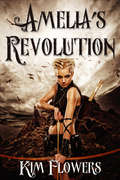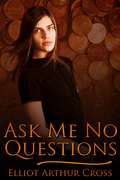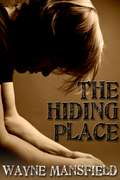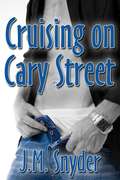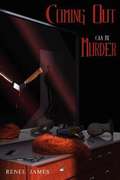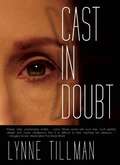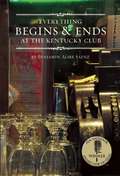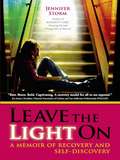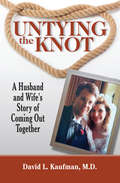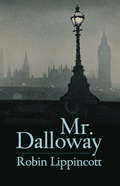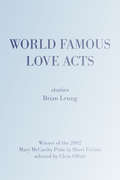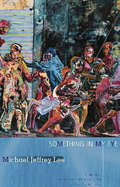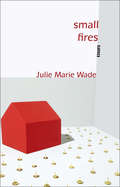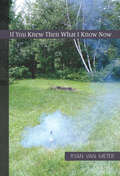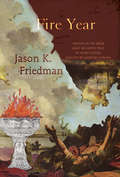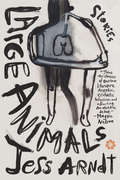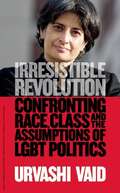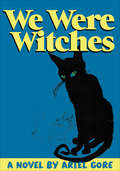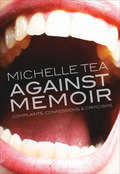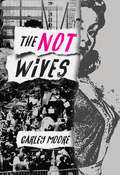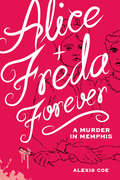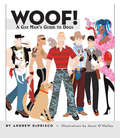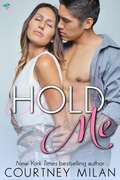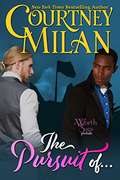- Table View
- List View
Amelia's Revolution
by Kim FlowersIn this alternate version of history, Amelia and her father, the governor of Delaware, attend a formal dinner at the capitol building with several other local leaders to meet with a delegate for Queen Victoria. The delegate declares the United States must sign a treaty with Britain to reinstate colonial rule, or else there will be war. Amelia runs away to warn the rest of the town, but not before she sees the most beautiful girl on earth. To Amelia's horror, the beautiful girl is one of the British delegate's slaves.Slavery had been abolished in the U.S. two generations ago, after the American Revolution. Automatons do the manual labor now, and all of the melting-pot cultures in the nation live in harmony. But in Britain there are still slaves, and gender-queer people are persecuted. Amelia knows she can't allow any treaty with Britain to be signed. She sneaks to the harbor of their coastal capital city and discovers not only the delegate's ship, but an armada on the horizon. She also sees the beautiful girl from before . . . and learns her name is Nadine.Amelia, her best friend Two-Spirit, and Nadine must organize a rebellion involving slaves, Lenni-Lenape warriors, automatons, and a mechanical horse cavalry. Will they be able to stop the British Imperial Navy? And will Amelia win Nadine's heart if she can help her become free?NOTE: The story is continued in the collection, Revolt of the Perfectly Free.
Ask Me No Questions
by Elliot Arthur CrossDylan Lakewood never imagined anyone would hit on him at his job working at the local shopping mall taking surveys for random products. But then he meets Trenton, a tall skater boy who puts the moves on him. Trenton introduces him to his shy friend, Bennett, who just happens to be on the run from the police, who think he murdered a college jock.When Dylan agrees to hide Bennett, he unwittingly pits himself against a killer desperate to keep a hundred thousand dollar secret.
The Hiding Place
by Wayne MansfieldLike a million other young gay men, Bryan keeps his sexuality hidden because it’s safer that way. Yet other guys know he’s different -- they sense it, and make Bryan’s life pure hell. At home, things aren’t much better. He barely acknowledges his alcoholic father, and his mother has little time to spend with her family. So Bryan is alone, with no support, no shoulder to cry on.Years of torture and torment, of name calling and humiliation, have taken their toll. Bryan does what he can to make new friends, but in trying to be something he’s not, he makes a huge mistake. Unable to cope with the repercussions, Bryan spends more and more time in a fantasy world he has created for himself. In this private world he is handsome, an object of desire. He is loved.Is the hiding place as perfect as it seems? Or will Bryan go too deep and not be able to come out again?
Cruising on Cary Street
by J. M. SnyderWillis Moore is a detective with the Richmond City police department who was suspended after a case he was working on went sour. After his first day back on the force, he cruises downtown Cary Street off-duty, looking for a little action. What he finds is a street punk and hustler named Corey who reminds him of a previous lover. Will wants a piece of Corey, and won't let his badge get in the way of hooking up.Note: This is part of the first chapter of the novel, Tricked Out . To read the full story behind Will and Corey, pick up the full book today!
Coming Out Can Be Murder
by Renee JamesFirst he wants her... then he wants her dead. Bobbi Logan's life and career begin to spiral downward when she comes out as a transgendered woman. But the gutsy hairdresser is determined to live her "new" life authentically, even as she is drawn into the investigation of her brutally murdered friend. The Chicago police have all but said they're not interested in the death of a "tranny" and the media has failed to report it. As she follows a trail of evidence through the shadowy underground of the Windy City, Bobbi is led to John Strand, a seductive powerbroker. Coming face-to-face with the number-one suspect can only lead to one thing... murder. But who will it be?
Cast in Doubt
by Lynne TillmanWhile the tumultuous 1970s rock the world around them, a collection of aging expatriates linger in a quiet town on the island of Crete, where they have escaped their pasts and their present. Among them is Horace, a gay American writer who fears he has finally reached old age. Friends only frustrate him, and his youthful Greek lover provides little satisfaction. Idling his time away with alcohol and working on a novel that he will never finish, Horace feels closer than ever to his own sorry end.That is, until a young, enigmatic American woman named Helen joins his crowd of outsiders. In Helen, Horace discovers someone brilliant, beautiful, and stubbornly mysterious - in short, she becomes his absolute obsession.But as Horace knows, people have a way of preserving their secrets even as they try to forget them. Soon, Helen's past begins to follow her to Crete. A suicidal ex-lover appears without warning; whispers of her long-dead sister surface in local gossip; and signs of ancient Gypsy rituals come to the fore. Helen vanishes. Deep down, Horace knows that he must find her before he can find any peace within himself.
Everything Begins and Ends at the Kentucky Club
by Benjamin Alire Sáenz<P><b>Winner of the 2013 PEN/Faulkner Award for Fiction!</b> <P>Benjamin Alire Sáenz's stories reveal how all borders--real, imagined, sexual, human, the line between dark and light, addict and straight--entangle those who live on either side. Take, for instance, the Kentucky Club on Avenida Juárez two blocks south of the Rio Grande. It's a touchstone for each of Sáenz's stories. His characters walk by, they might go in for a drink or to score, or they might just stay there for a while and let their story be told. Sáenz knows that the Kentucky Club, like special watering holes in all cities, is the contrary to borders. It welcomes Spanish and English, Mexicans and gringos, poor and rich, gay and straight, drug addicts and drunks, laughter and sadness, and even despair. It's a place of rich history and good drinks and cold beer and a long polished mahogany bar. Some days it smells like piss. "I'm going home to the other side." That's a strange statement, but you hear it all the time at the Kentucky Club. <P>Benjamin Alire Sáenz is a highly regarded writer of fiction, poetry, and children's literature. Like these stories, his writing crosses borders and lands in our collective psyche. Poets & Writers Magazine named him one of the fifty most inspiring writers in the world. He's been a finalist for the Los Angeles Times Book Prize and PEN Center's prestigious award for young adult fiction. Sáenz is the chair of the creative writing department of University of Texas at El Paso.
Leave the Light On
by Jennifer StormA revealing, hopeful account of a young woman's ascent out of the bleak despair of addiction and how recovery helped her confront the traumas and secrets that kept her living in the dark for so long.
Untying the Knot: A Husband and Wife's Story of Coming Out Together
by David L. KaufmanBy all accounts, David Kaufman, M.D., had a good life—he was married to a woman he loved, had three children, and a fulfilling career as a radiologist. But as the years passed, he realized that he could no longer deny who he was—he was a gay man. However, before he could tell his wife, she told him she needed to talk to him about an important issue. It was then that she confided in him that she had accepted the growing awareness that she was gay. Her announcement surprised him, but made it easier for him to tell her he, too, was gay. In Untying the Knot, David Kaufman shares a unique story of coming out and how he and his former wife have helped each other on their separate journeys into new lives.
Mr. Dalloway: A Novella
by Robin LippincottA virtuoso performance of postmodern daring, Mr. Dalloway offers a rich augmentation of Virginia Woolf's classic novel.It is June 29, 1927ÑRichard and Clarissa Dalloway's thirtieth anniversary and also a day of historical significance. Richard has arranged a surprise party for his wife. As he leaves their house in Westminster to buy flowers for the party, his thoughts turn to Robert Davies (Robbie), a young editor at Faber with whom he has been having an affair off and on for many years. Because of Richard's efforts to contain their relationship, Robbie has exposed their affair in a letter to Clarissa, who tells her husband that she "understands" And today Richard, despite his misgivings, finds himself on his way to Robbie's house-only to be shaken by the discovery that Robbie is not there.As does the Woolf novel, Mr. Dalloway takes place within a single day, unfolding prismatically with a simultaneity of events: Clarissa walks in London and remembers her courtship with Richard; their daughter Elizabeth searches for answers about her eccentric history tutor's somewhat mysterious and premature death; and a determined and drunken Robert Davies has decided to crash Richard's party, dressed all in white satin, no less! As the novella moves toward its surprising climax, it revisits several of Woolf's celebrated characters-Sally Seton (now Lady Rosseter), Hugh Whitbread, Lady Bruton-while introducing new ones, such as the Sapphist couple Katherine Truelock and Eleanor Gibson, and the strange and beautiful Sasha Richardson.Imaginative and formally bold as it refracts Woolf's fiction to invent a story completely Lippincott's own, Mr. Dalloway rides forward on waves of a masterfully complex and musical prose, full of wit, linguistic verve, and startling imagery.Robin Lippincott is the author of The Real, True Angel, a collection of short stories published in 1996 by Fleur-de-Lis Press. His fiction and nonfiction have appeared in The New York Times Book Review, The American Voice, The Literary Review, Provincetown Arts, and many other magazines; he was awarded fellowships to Yaddo in 1997 and 1998. Born and raised in the South, he has lived in Boston for twenty years. He is curren
World Famous Love Acts: Stories
by Brian Leung"An entire book of good stories. . . . [Leung] gains trust the old-fashioned way-through confidence, craftsmanship and compassion. There are no shortcuts here, no tricks or gimmicks, no glib patinas to conceal weak underpinnings. . . . This is a book about loss, twined irrevocably with hope, a hope that surges below the surface of all life. . . . Read [it] and see a bold new writer making himself vulnerable on the page. He gives us all hope."-Chris OffuttSweeping and fearless, World Famous Love Acts overrides stereotypes of race, age, gender, and sexuality. In this remarkable debut collection, Brian Leung creates a diverse landscape of distinctive characters. Among them, a 4' 10" hyperblonde Asian adult-film actress in Los Angeles, an archeologist working in China with her sun-scarred skin, a Midwestern screenwriter trying to "burn off" his accent, and a man with AIDS waiting to go home to die.Loneliness and a persistent reach for meaning and comfort hold all these characters together. In "Six Ways to Jump off a Bridge," a Chinese egg-farmer confronts the solitude of old age after learning yet another person has made a suicidal jump from the bridge overlooking his home. In "Executing Dexter," two young boys from broken homes invent ways to torture and kill handmade dolls. And "Leases" takes place during "the time of morning to choose names for babies that will never be born" as a man waits to meet his wife in an apartment where for years he has brought male lovers.Brian Leung writes like a true anthropologist, as both passionate outsider and gifted empath. His prose is crafted but genuine, both controlled and embracing. There seem to be no shoes he won't try on as he poignantly brings to life the search for a world of rescue and absolution.Born to a Chinese father and Euro-American mother, Brian Leung is a native of California, where he is now an assistant professor at California State University, Northridge. He received an M.F.A in creative writing from Indiana University.
Something in My Eye: Stories (Mary Mccarthy Prize In Short Fiction Ser.)
by Francine Prose Michael Jeffrey Lee"I was drawn to Michael Jeffrey Lee's line-up of loners and drifters, imperiled children, and haunted psychos neither because I want to hang out with these bad boys, nor because I plan to cross the street when I see them coming, but because the invitation to inhabit their minds, to see the world through their eyes, and to watch their often unsettling stories play out in space and time enables Lee to do all sorts of extremely interesting things with consciousness and language."-Francine Prose, judge for the Mary McCarthy Prize in Short FictionMichael Jeffrey Lee's stories are bizarre and smart and stilted, like dystopic fables told by a redneck Samuel Beckett. Outcasts hunker under bridges, or hole up in bars, waiting for the hurricane to hit. Lee's forests are full of menace too-unseen crowds gather at the tree-line, and bands of petty crooks and marauders bluster their way into suicidal games of one-upmanship. In Something In My Eye, violence and idleness are always in tension, ratcheting up and down with an eerie and effortless force. Diction leaps between registers with the same vertiginous swoops, moving from courtly formality to the funk and texture of a slang that is all the characters' own. It's a masterful performance, and Lee's inventiveness accomplishes that very rare feat-hyper-stylized structure and language that achieve clarity out of turbulence, never allowing technique to obscure what's most important: a direct address that makes visible all those we'd rather not see.Michael Jeffrey Lee lives in New Orleans, Louisiana, where he earns his living as a typist, waiter, and nightclub singer. A frequent contributor to Conjunctions, he is also an associate fiction editor at the New Orleans Review. He is at work on a novel.
Small Fires: Essays (Linda Bruckheimer Series In Kentucky Literature Ser.)
by Julie Marie WadeThis is a daughter's story. In Small Fires, Julie Marie Wade recreates the landscape of her childhood with a lacemaker's care, then turns that precise attention on herself. There are floating tea lights in the bath, coddled blossoms in the garden, and a mother straddling her teenage daughter's back, astringent in hand, to better scrub her not-quite-presentable pores. And throughout, Wade traces this lost world with the same devotion as her mother among her award-winning roses. Small Fires is essay as elegy, but it is also essay as parsing, reconciliation, and celebration, all in the attempt to answer the question-what have you given up in order to become who you are?
If You Knew Then What I Know Now
by Ryan Van MeterThe middle American coming-of-age has found new life in Ryan Van Meter's coming-out, made as strange as it is familiar by acknowledging the role played by gender and sexuality. In fourteen linked essays, If You Knew Then What I Know Now reinvents the memoir with all-encompassing empathy-for bully and bullied alike. A father pitches baseballs at his hapless son and a grandmother watches with silent forbearance as the same slim, quiet boy sets the table dressed in a blue satin dress. Another essay explores origins of the word "faggot" and its etymological connection to "flaming queen." This deft collection maps the unremarkable landscapes of childhood with compassion and precision, allowing awkwardness its own beauty. This is essay as an argument for the intimate-not the sensational-and an embrace of all the skinned knees in our stumble toward adulthood.Ryan Van Meter grew up in Missouri and studied English at the University of Missouri-Columbia. After graduating, he lived in Chicago for ten years and worked in advertising. He holds an MA in creative writing from DePaul University and an MFA in nonfiction writing from the University of Iowa. His essays have appeared in The Gettysburg Review, Indiana Review, Gulf Coast, Arts & Letters, and Fourth Genre, among others, and selected for anthologies including Best American Essays 2009. In the summer of 2009, he was awarded a residency at the MacDowell Colony. He currently lives in California where he is an assistant professor of creative nonfiction at the University of San Francisco.
Fire Year (Mary Mccarthy Prize In Short Fiction Ser.)
by Jason K. Friedman Salvatore ScribonaSeven stories investigate art, sexuality, love, and religion. Characters include a gay man who attends his high school reunion where he's pursued by the now-married former football star, and an awkward teenager grappling with notions of God and girls at his bar mitzvah. Friedman crafts a vivid picture of religious, cultural, and sexual minorities in Georgia and the Deep South.
Large Animals: Stories
by Jess ArndtA Buzzfeed Best Fiction Book of 2017 • An Entropy magazine Best Book of 2017 “Jess Arndt’s Large Animals is wildly original, even as it joins in with the classics of loaded, outlaw literature. Acerbic, ecstatic, hilarious, psychedelic, and affecting in turn, this is an electric debut.” —Maggie Nelson, National Book Critics Circle Award–winning author of The Argonauts Jess Arndt's striking debut collection confronts what it means to have a body. Boldly straddling the line between the imagined and the real, the masculine and the feminine, the knowable and the impossible, these twelve stories are an exhilarating and profoundly original expression of voice. In “Jeff,” Lily Tomlin confuses Jess for Jeff, instigating a dark and hilarious identity crisis. In “Together,” a couple battles a mysterious STD that slowly undoes their relationship, while outside a ferocious weed colonizes their urban garden. And in “Contrails,” a character on the precipice of a seismic change goes on a tour of past lovers, confronting their own reluctance to move on.Arndt’s subjects are canny observers even while they remain dangerously blind to their own truest impulses. Often unnamed, these narrators challenge the limits of language—collectively, their voices create a transgressive new formal space that makes room for the queer, the nonconforming, the undefined. And yet, while they crave connection, love, and understanding, they are constantly at risk of destroying themselves. Large Animals pitches toward the heart, pushing at all our most tender parts—our sex organs, our geography, our words, and the tendons and nerves of our culture.
Irresistible Revolution: Confronting Race, Class and the Assumptions of Lesbian, Gay, Bisexual, and Transgender Politics
by Urvashi VaidFrom one of the nation's best-known social justice leaders and community activists comes a strategic and informed argument about the pitfalls of limited political vision, and the benefits of an agenda that encompasses, yet moves beyond, equality. The LGBT movement is on one of the most active, contested, and engaging social movements in the world. This optimistic book challenges advocates for LGBT rights in the U. S. to aspire beyond the narrow framework of equality. It outlines a more substantive politics with race, class, and gender at its foundation, and suggests that such a politics will produce greater and more meaningful change for a larger number of people. Irresistible Revolution is intended for a broad and general audience. The book turns an experienced and thoughtful lens onto many common controversies, rhetoric, and strategic questions that face contemporary social change movements: pursuit of broad or narrow agendas, integration of economic and racial justice, integrating sexual orientation and gender identity in human rights frameworks, the persistence of sexism, the dilemmas of bipartisanship, and the challenge of seeing beyond the short term to secure gains made for the long run.
We Were Witches: A Novel
by Ariel GoreThis inspirational &“magic-infused narrative . . . is a moving account of a young writer and mother striving to claim her own agency and find her voice&” (Publishers Weekly). Buying into the dream that education is the road out of poverty, a teen mom takes a chance on bettering herself and talks her way into college. But once she&’s there, phallocratic narratives permeate every subject. Wryly riffing on feminist literary tropes, We Were Witches documents the survival of a demonized single lesbian mother as she&’s beset by custody disputes, homophobia, and America&’s ever-present obsession with shaming unconventional women into passive citizenship. But even as the narrator struggles to graduate, a question uncomfortably lingers: If you&’re dealing with precarious parenthood, queer identity, and debt, what is the true narrative shape of your experience?
Against Memoir: Complaints, Confessions & Criticisms
by Michelle TeaThe PEN Award-winning essay collection about queer lives: &“Gorgeously punk-rock rebellious.&”—The A.V. Club The razor-sharp but damaged Valerie Solanas; a doomed lesbian biker gang; recovering alcoholics; and teenagers barely surviving at an ice creamery: these are some of the larger-than-life, yet all-too-human figures populating America&’s fringes. Rife with never-ending fights and failures, theirs are the stories we too often try to forget. But in the process of excavating and documenting these queer lives, Michelle Tea also reveals herself in unexpected and heartbreaking ways. Delivered with her signature honesty and dark humor, this is the first-ever collection of journalistic writing by the author of How to Grow Up and Valencia. As she blurs the line between telling other people&’s stories and her own, she turns an investigative eye to the genre that&’s nurtured her entire career—memoir—and considers the price that art demands be paid from life. &“Eclectic and wide-ranging…A palpable pain animates many of these essays, as well as a raucous joy and bright curiosity.&” —The New York Times &“Queer counterculture beats loud and proud in Tea&’s stellar collection.&” —Publishers Weekly (starred) &“The best essay collection I've read in years.&”—The New RepublicWinner of the PEN/Diamonstein-Spielvogel Award for the Art of the Essay
The Not Wives
by Carley MooreAn Occupy-era New York City novel following three women. “A provocative and well-told story about chosen community, friendship, and human frailty.” —Kirkus Reviews (starred review)The Not Wives traces the lives of three women as they navigate the Occupy Wall Street movement and each other. Stevie is a nontenured professor and recently divorced single mom; her best friend Mel is a bartender, torn between her long-term girlfriend and her desire to explore polyamory; and Johanna is a homeless teenager trying to find her way in the world, who bears shared witness to a tragedy that interlaces her life with Stevie’s.In the midst of economic collapse and class conflict, late-night hookups and long-suffering exes, the three characters piece together a new American identity founded on resistance—against the looming shadow of financial precarity, the gentrification of New York, and the traditional role of wife.“Audacious and exhilarating in its candor, The Not Wives captures the heady mix of pleasures and agonies necessary to turn one’s life in a new, truer direction. Carley Moore attends to the complexities of urban living and activism with riveting clarity.” —Idra Novey, award-winning author of Those Who Knew“The Not Wives is gritty, sexy, very queer, literary social realism that’s up-all-night compelling—just what I want from a novel set in NYC in the time of Occupy, with its sprawling cast of adjuncts, bartenders, poets, single parents, little kids, homeless teenagers, and serious organizers embroiled in various romantic and economic complications. When we say report back, this is what we mean!” —Andrea Lawlor, author of Paul Takes the Form of a Mortal Girl
Tomboy: A Graphic Memoir
by Liz PrinceGrowing up, Liz Prince wasn't a girly girl, dressing in pink tutus or playing Pretty Pretty princess like the other girls in her neighborhood. But she wasn't exactly one of the guys either, as she quickly learned when her Little League baseball coach exiled her to the outfield instead of letting her take the pitcher's mound. Liz was somewhere in the middle, and Tomboy is the story of her struggle to find the place where she belonged.Tomboy is a graphic novel about refusing gender boundaries, yet unwittingly embracing gender stereotypes at the same time, and realizing later in life that you can be just as much of a girl in jeans and a T-shirt as you can in a pink tutu. A memoir told anecdotally, Tomboy follows author and zine artist Liz Prince through her early childhood into adulthood and explores her ever-evolving struggles and wishes regarding what it means to "be a girl."From staunchly refuting anything she perceived as being "girly" to the point of misogyny, to discovering through the punk community that your identity is whatever you make of it, regardless of your gender, Tomboy is as much humorous and honest as it is at points uncomfortable and heartbreaking. <P><P> <i>Advisory: Bookshare has learned that this book offers only partial accessibility. We have kept it in the collection because it is useful for some of our members. Benetech is actively working on projects to improve accessibility issues such as these.</i>
Alice + Freda Forever
by Alexis CoeIn 1892, America was obsessed with a teenage murderess, but it wasn't her crime that shocked the nation--it was her motivation. Nineteen-year-old Alice Mitchell had planned to pass as a man in order to marry her seventeen-year-old fiancée Freda Ward, but when their love letters were discovered, they were forbidden from ever speaking again. Freda adjusted to this fate with an ease that stunned a heartbroken Alice. Her desperation grew with each unanswered letter--and her father's razor soon went missing. On January 25, Alice publicly slashed her ex-fiancée's throat. Her same-sex love was deemed insane by her father that very night, and medical experts agreed: This was a dangerous and incurable perversion. As the courtroom was expanded to accommodate national interest, Alice spent months in jail--including the night that three of her fellow prisoners were lynched (an event which captured the attention of journalist and civil rights activist Ida B. Wells). After a jury of "the finest men in Memphis" declared Alice insane, she was remanded to an asylum, where she died under mysterious circumstances just a few years later. Alice + Freda Forever recounts this tragic, real-life love story with over 100 illustrated love letters, maps, artifacts, historical documents, newspaper articles, courtroom proceedings, and intimate, domestic scenes--painting a vivid picture of a sadly familiar world.
Woof!: A Gay Man's Guide to Dogs
by Andrew De Prisco Jason O'MalleyThe book Joan Rivers calls "my dog bible," Woof! is the quintessential queer guide for dog lovers, offering a hilarious take on gay dog ownership unlike any other book out there! <P><P>Author Andrew De Prisco and illustrator Jason O'Malley have created a LGBTQ classic that defines the 28 "breeds" of gay men and recommends which breeds are best for each. From Drag Queen and All-American Boy to Twink, Leatherman, and Log Cabin Queer, every gay man will find advice and hilarity on every page of this award-winning gift book. (For gay men who are not sure of their breed, there is a temperament sorter to help determine their homo DNA.) In addition to being a breed-selection guide for the dog-loving Q-set, Woof! provides no-nonsense information about how to purchase a dog from a breeder, bringing the puppy home, training, caring, and feeding for the dog. It also offers tongue-in-cheek pointers along the lines of choosing the best gay name for the puppy, shopping for extravagant accessories, throwing a gay puppy shower (for the gifts!), hiring the right staff to take care of the puppy, and using the well-cared-for dog as a man magnet. DePrisco, who has been actively involved in the dog world (and gay world) for over two decades, has tapped all his doggy resources to bring readers the most fabulous advice from some of the nation's Top Dog Men, including breeders of Westminster Best in Show winners, world-revered judges, and international canine experts. The chapter "Studs and Bitches: The Secret Sex Lives of Dogs" addresses hot topics such as homosexual dogs, promiscuity in the dog world, and getting unleashed and hooking up at dog parks. In the book's final chapter ,"The Rainbow Tour: Stepping Out in Gay Society," the author throws a virtual pride parade of doggy activities, from the über-queer world of dog shows to vacations, gay resorts, and camping (with actual tents!). The true message of the book-beyond the campy humor, wildly funny illustrations, and off-color remarks-rings out from every page: Woof! is for everyone who wants to be the most responsible and devoted dog owners on the planet.
Hold Me
by Courtney MilanJay na Thalang is a demanding, driven genius. He doesn’t know how to stop or even slow down. The instant he lays eyes on Maria Lopez, he knows that she is a sexy distraction he can’t afford. He’s done his best to keep her at arm’s length, and he’s succeeded beyond his wildest dreams. <p><p> Maria has always been cautious. Now that her once-tiny, apocalypse-centered blog is hitting the mainstream, she’s even more careful about preserving her online anonymity. She hasn’t sent so much as a picture to the commenter she’s interacted with for eighteen months—not even after emails, hour-long chats, and a friendship that is slowly turning into more. Maybe one day, they’ll meet and see what happens. <p> But unbeknownst to them both, Jay is Maria’s commenter. They’ve already met. They already hate each other. And two determined enemies are about to discover that they’ve been secretly falling in love…
The Pursuit Of…: A Trio Of Romances
by Courtney MilanWhat do a Black American soldier, invalided out at Yorktown, and a white British officer who deserted his post have in common? Quite a bit, actually. <ul> <li>They attempted to kill each other the first time they met.</li> <li>They're liable to try again at some point in the five-hundred mile journey that they're inexplicably sharing.</li> <li>They are not falling in love with each other.</li> <li>They are not falling in love with each other.</li> <li>They are… Oh, no.</li> </ul> <P><P>The Pursuit Of… is about a love affair between two men and the Declaration of Independence. It’s a novella of around 38,000 words.
